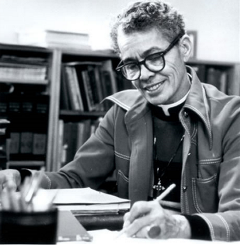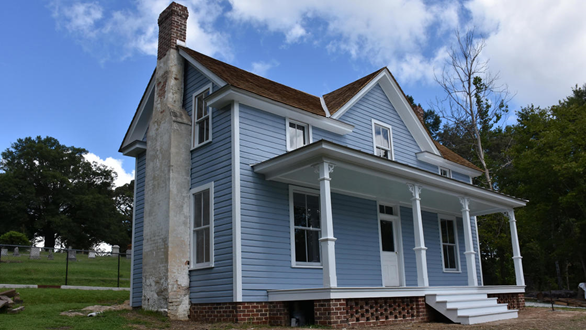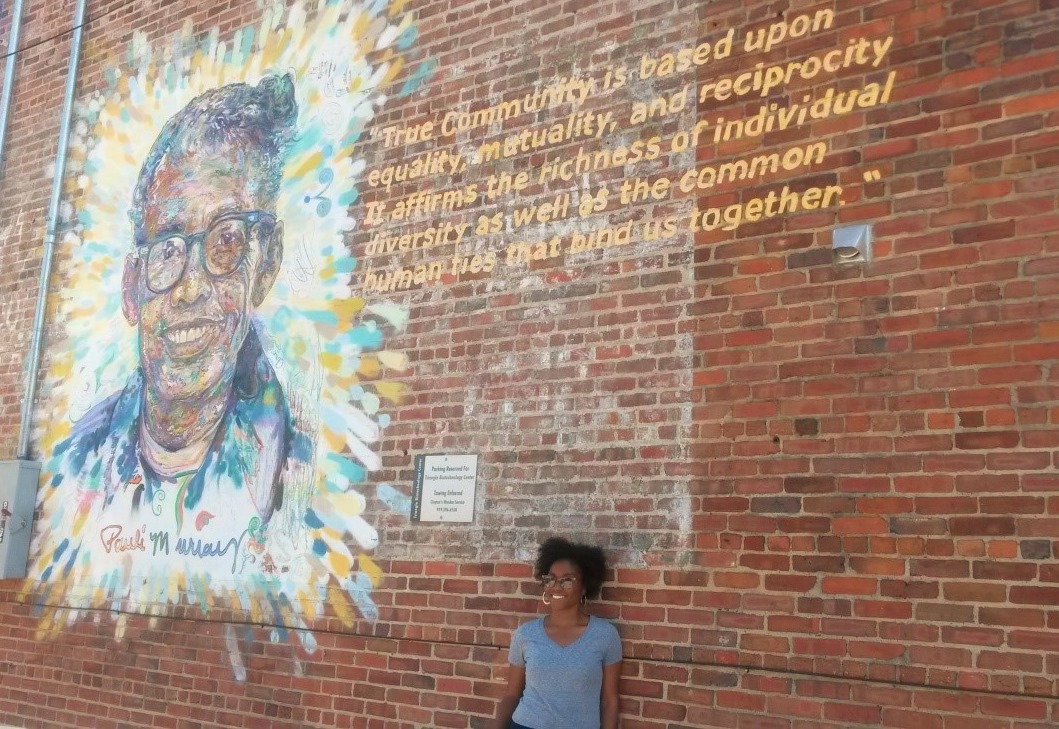Since moving to Durham in 2014, I have been fascinated by this city's history —specifically the rich history of black people here. I soak up opportunities to learn more about the legacy of entrepreneurship on Black Wall Street, black organizing through groups such as the Durham Committee on the Affairs of Black People and the significance of neighborhoods where black people could live, work and thrive in spite of Jim Crow.
In my learning, I came across the name Pauli Murray and instantly felt that everything she stood for in her life as a women's and civil rights activist, lawyer, poet and priest continues to be so important and relevant for our current times.

Pauli Murray at work. Courtesy of the NC Collection, Wilson Library in Chapel Hill, NC.
Pauli Murray spent her formative years living with relatives in Durham, graduating from Hillside High School in 1926. She was quite the firebrand — attempting to integrate UNC Chapel Hill in 1938, getting arrested for refusing to sit on a broken seat in the back of a segregated bus in 1940 Virginia, graduating first in her class while being the only woman at Howard Law School in 1944, co-founding the National Organization for Women in the 1960s and becoming the first black woman ordained as an Episcopal priest. She was a brilliant writer and legal scholar whose thoughts informed presidents.
Despite her accomplishments, Pauli struggled as a black woman who did not conform to gender norms and experienced rejection due to her intersecting identities. However, she persisted, and her struggles fueled her fight against discrimination of all kinds. She sought freedom from oppression — to be accepted as a human being and respected for her knowledge and expertise. I am inspired that Pauli never allowed her voice to be silenced even as doors were shut in her face.
Last month, it was announced that Pauli Murray’s family home in Durham was designated as a National Historic Landmark (NHL). It is the first of 39 North Carolina sites focused on a black woman, and one of the few national sites of any kind that recognizes an LGBTQ woman of color.

The Pauli Murray house in Durham, NC. Photo by Barbara Lau.
By 2020, the house will be open to the community to further Pauli’s legacy as a community space where all are welcome. As Martin Eakes, Self-Help's CEO, wrote in a support letter for the NHL nomination:
“We believe that communities that know and care about their histories are communities that work together and prosper.”
I am pleased that Self-Help — in partnership with the Durham Quality of Life Project, Duke University and other community organizations — has contributed to the preservation of this awesome woman’s legacy. Her family’s home in the West End neighborhood is in our land bank, which is part of a community effort to stabilize and maintain this historically black neighborhood in the midst of a gentrifying Durham.
I am excited that this amazingly brilliant black woman is getting her due and being recognized for her contributions in making this country a more equitable place for all.
Learn more about Pauli's life and work here.
You can also join the Pauli Murray Center for a work day to clean up around the house on March 11, 2017, 9am-noon and for a celebration of the NHL designation on the afternoon of April 1, 2017.

The author, Brittany Bennett, next to a tribute wall in Durham. Photo by Katherine Shor.
Brittany Bennett is a commercial loan officer at Self-Help, based in Durham. She is also the board treasurer for the Pauli Murray Center for History and Social Justice.